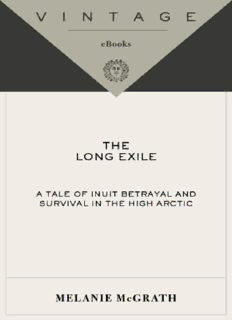
The Long Exile: A Tale of Inuit Betrayal and Survival in the High Arctic PDF
Preview The Long Exile: A Tale of Inuit Betrayal and Survival in the High Arctic
Praise for Melanie McGrath's THE LONG EXILE “Vivid. … Through ambitious research and interviews with survivors, McGrath acquaints the reader with this horrific, but important, social history.” —The Providence Journal “McGrath is a gifted, passionate and sensitive storyteller, and through her the authentic voice of the Arctic … rings loud and clear…. Fresh, illuminating and heartbreaking.” —The Sunday Telegraph (London) “Adroit, informed storytelling.” —San Francisco Chronicle “Meticulously researchedMcGrath lived among the Inuit for a timethis is an engaging and poignant read.” —New Scientist “McGrath … has a wonderful feel for landscape and so the Arctic itself assumes the life of a character…. The language is lovely. Modulated, lyrical and beautiful as the stark nature it describes, it makes McGrath's book more than a fascinating and instructive read. It makes it a joyful one.” —Evening Standard (London) “Biting cold jumps off of these pages.” —The Flint Journal T L E Melanie McGrath HE ONG XILE Melanie McGrath's first book, Motel Nirvana, won the John Llewelyn Rhys Prize. Her third book, Silvertown, was shortlisted for the James Tait Black Memorial Prize for Biography. She is a regular contributor to The Guardian, The Times, The Telegraph, and the Evening Standard and has produced and presented television shows for Discovery Channel and the UK's Channel 4. She lives and works in London. ALSO BY MELANIE MCGRATH Motel Nirvana Hard, Soft & Wet Silvertown An Eskimo lives with menace, it is always ahead of him, over the next white ridge. —ROBERT FLAHERTY PREFACE THERE HAVE BEEN many books written about the Arctic, mostly tales of explorers and derring-do. This book isn't one of those. It is rather the story of a movie and the legacy left behind by its maker. The film is Nanook of the North, which has been described by filmmakers as diverse as Orson Welles and John Huston as one of the greatest pictures ever made. Its Irish-American director, Robert Flaherty, arrived in the small settlement of Inukjuak on the east coast of the Hudson Bay in 1920 to make it. He filmed it in a year, but was haunted by it for the rest of his life. The movie's success helped colour the Western view of Inuit life in the Arctic for generations. It does so today. Flaherty never returned to the Arctic, but he left a son there, who grew up Inuit. More than thirty years later, a group of Inuit men and women were removed from Inukjuak by the Canadian government and taken hundreds of miles north to the uninhabited High Arctic. Among them was Robert Flaherty's son. This book is as much about Josephie Flaherty and his family as it is about his father's movie. It is often said that the Inuit have dozens of words for snow. While this is true it doesn't tell the whole story. The Inuit do have many words to describe snow, but they also differentiate between various kinds of snow those of us who don't live in the Arctic would see as being essentially the same. It's not so much that the Inuit have dozens of words for snow, as that, in the Inuit world, there are dozens of different kinds of snow. There are also emotional differences in the way Westerners and Inuit view the world. Until very recently, emotions like envy or sexual possessiveness were so perilous to the equilibrium of the Inuit living as they did in family groups, often separated from each other by thousands of square miles of ice and tundrathat they were vigorously discouraged. There was a time when expressing rage, lust or ambition was considered so threatening to the group's survival that persistent offenders were ostracised from the community and sent to their deaths on the tundra; some were even killed outright, often by their own families. For thousands of years, these threatening emotional traits were suppressed to such a degree that they were rarely felt among the majority. Other, more helpful traits crept in to take their place: modesty, patience, acceptance of group decisions and a sense of being not just bound to the group, but being an integral part of it, a vital organ in the family body. These are more common and more valued character traits among Inuit even today than they are among people living in large cities in the West. Although it regularly occurs, we are not necessarily aware of a similar process of emotional editing taking place in our own lives. It's not hard to recall feelings those of us living urban lives have allowed to wither: a wonder and respect for nature, a feeling of being at one with the land, an inexorable identification with home and family, a sense of belonging. We may regret the passing of these feelings; indeed, if our appetites for nostalgia are anything to go by, we certainly do, but few of us would want to go back and live as our great-great grandfathers and grandmothers lived; nor must we in order to feel respect, even awe, for what our ancestors endured and the kind of people they were. It is easy to feel disconnected from human beings to whom we are neither related by blood nor fate and with whom we share few cultural connections; people whose range of emotional expression and personalities may feel very different from our own or from anyone we know. And so, when you read this story, bear this in mind: however many kinds of snow there are and however many words for them, they all, in the end, melt down to water.
Description: